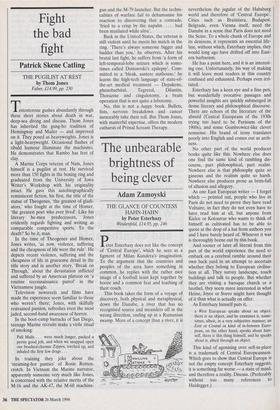The unbearable brightness of being clever
Adam Zamoyski
THE GLANCE OF COUNTESS HAHN-HAHN by Peter Esterhazy Weidenfeld, £14.95, pp. 246 Peter Esterhazy does not like the concept of 'Central Europe', which he sees as a figment of Milan Kundera's imagination. To the argument that the countries and peoples of the area have something in common, he replies with the rather nice image of a football team kept together by booze and a common fear and loathing of their coach.
This book takes the form of a voyage of discovery, both physical and metaphysical, down the Danube, a river that has no recognised source and meanders off in the wrong direction, ending up in a Rumanian swamp. More of a concept than a river, it is nevertheless the jugular of the Habsburg world and therefore of 'Central Europe'. Cities such as Bratislava, Budapest, Belgrade, even Vienna itself, need the Danube in a sense that Paris does not need the Seine. To a whole chunk of Europe and its denizens, it represents an essential life- line, without which, Esterhazy implies, they would long ago have drifted off into East- ern barbarism.
He has a point here, and it is an interest- ing one. Unfortunately, his way of making it will leave most readers in this country confused and exhausted. Perhaps even irri- tated.
Esterhazy has a keen eye and a fine pen, but wonderfully evocative passages and powerful insights are quickly submerged in dense literary and philosophical discourse. There are echoes of the literature of the absurd (Central Europeans of the 1930s trying too hard to be Parisians of the 1900s), and some Gombrowicz-like clever nonsense. His brand of irony translates poorly into English and comes out as arch- ness.
No other part of the world produces books quite like this. Nowhere else does one find the same kind of rambling dis- course, part philosophical, part realist. Nowhere else is that philosophy quite so gaseous and the realism quite so harsh. Nowhere else produces prose as brim-full of allusion and allegory.
As one East European writer — I forget which — pointed out, people who live in Paris do not need to prove they have read Voltaire, in fact they do not even have to have read him at all, but anyone from Kielce or Koloszvar who wants to think of himself as cultivated has to be able to quote at the drop of a hat from authors you and I have barely heard of. Whoever it was is thoroughly borne out by this book.
And sooner or later all literati from this part of the world experience the need to embark on a cerebral ramble around their own back yard in an attempt to ascertain whether they belong to European civilisa- tion at all. They survey landscape, touch buildings and talk to people. But whether they are visiting a baroque church or a brothel, they seem more interested in what Heine, Joyce or Svevo might have thought of it than what is actually on offer.
As Esterhazy himself puts it, a West European speaks about an object, there is an object, and he examines it, some- times, albeit, in a very subjective manner; an East or Central or kind of in-between Euro- pean, on the other hand, speaks about him- self, there is this thing himself, and he speaks about it, albeit through an object.
This kind of agonising over self-in-place is a trademark of Central Europeanness. Which goes to show that Central Europe is not the empty concept Esterhazy suggests, it is something far worse — a state of mind, and therefore a reality. Discuss. (Preferably without too many references to Heidegger.)


























































 Previous page
Previous page